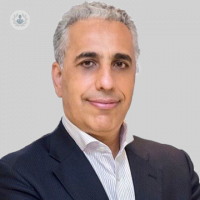Empowering breast health
Written in association with:Breast cancer remains a prevalent concern for women worldwide, but proactive measures can significantly reduce the risk. In his latest online article, Professor Kefah Mokbel gives us his insights into incorporating specific lifestyle changes, dietary adjustments, and screening protocols that can empower women in their journey towards breast cancer prevention.

Embrace the mediterranean diet
One of the cornerstones of breast cancer prevention is adopting a Mediterranean diet. This dietary pattern, rich in fruits, vegetables, whole grains, nuts, and olive oil, has been linked to a lower risk of breast cancer.
Moderate alcohol consumption
Limiting alcohol intake is crucial, with recommendations suggesting no more than one glass of wine per day. Excessive alcohol consumption is associated with an increased risk of breast cancer.
Maintain healthy weight and exercise regularly
Striving for a healthy body weight and engaging in regular physical activity, with at least 20 minutes of exercise daily, can significantly reduce the risk of breast cancer. It's important to note that maintaining a healthy weight becomes particularly crucial after menopause.
Opt for a breast-friendly diet
Watch your dietary choices by minimising consumption of red meat, processed meat, refined grains, animal fat, and full-fat dairy products. Instead, focus on incorporating cancer-fighting foods like olive oil, garlic, leafy vegetables, citrus fruits, and berries into your meals.
Consider soy in moderation
Soy foods can be enjoyed in moderation as part of a balanced diet. While there were concerns in the past, current evidence suggests that moderate soy consumption is generally safe.
Sun exposure and vitamin D
Ensure adequate exposure to natural sunlight or consider vitamin D3 supplements if sunlight exposure is limited. Aim for at least 20 minutes of sunlight exposure daily to maintain optimal vitamin D levels.
Hormone replacement therapy (HRT)
Approach hormone replacement therapy cautiously, especially after the age of 55. Discuss the benefits and risks with your healthcare provider, considering alternatives like topical vaginal oestrogen for symptom relief.
Integrate cancer-fighting nutrients
Incorporate polyphenols, flavonoids, quercetin, spices like turmeric and black pepper, and cruciferous vegetables into your diet. These nutrients possess potent anti-cancer properties.
Essential supplements
Consider supplementing with vitamin D3, omega-3 fatty acids, vitamin B6, beta-carotene, vitamin C, and folate to ensure adequate nutrient intake. OncoMute, a comprehensive supplement, encapsulates these micronutrients in one convenient form.
Breast cancer screening
Regular screening is paramount for early detection and treatment of breast cancer. All women should undergo breast cancer risk assessment by age 30. For average-risk women, annual mammograms starting at age 40 are recommended. Women with dense breasts may benefit from supplemental ultrasound scans. High-risk individuals may require more frequent and earlier screenings, including both mammograms and MRIs.
Empower yourself with knowledge and proactive measures to reduce your risk of breast cancer. By incorporating these guidelines into your lifestyle and prioritising regular screenings, you take significant strides towards maintaining breast health and overall well-being.
Professor Kefah Mokbel is an esteemed oncoplastic breast surgeon. You can schedule an appointment with Professor Mokbel on his Top Doctors profile.


